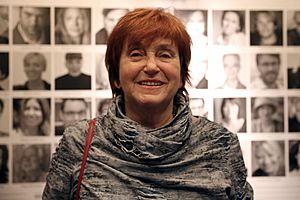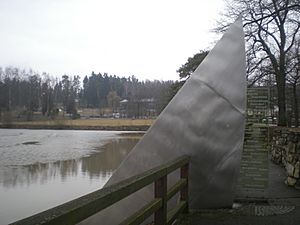Valie Export facts for kids
Quick facts for kids
Valie Export
|
|
|---|---|

Valie Export in 2013
|
|
| Born |
Waltraud Lehner
17 May 1940 |
| Nationality | Austrian |
| Known for | Artist |
|
Notable work
|
Cinema Work, Photography, Sculpture, Computer Animations |
| Movement | Avant-Garde, Performance art, Contemporary art |
| Awards | Grand Gold Decoration for Services to the Republic of Austria |
Valie Export (often written as 'VALIE EXPORT'; born May 17, 1940) is an avant-garde Austrian artist. She is well-known for her exciting public art shows and special film projects. Her art also includes video installations, computer animations, photography, sculptures, and books about modern art.
Contents
Early Life and Education
Valie Export was born Waltraud Lehner in Linz, Austria. She grew up in Linz with her mother. Export studied painting, drawing, and design at a special school for textiles in Vienna.
Artistic Journey
Starting Out: The 1960s and 1970s
In the late 1960s and early 1970s, Valie Export decided to change her name from Waltraud Hollinger to VALIE EXPORT. She explained that she wanted a name that was her own, not from her father or former husband. She wanted to "export" her ideas to the world. This name change showed her strong desire to be independent in the art world.
At that time, the art scene in Vienna was very active. A group called the Vienna Actionists created exciting and sometimes shocking art shows. Valie Export was influenced by this energy. She used her own body in her art to make strong statements. Her work often explored how media showed women and how this affected them. Her art was clearly about women's rights and challenging old ideas.
One of Export's famous early art pieces was Tapp-und-Tast-Kino (Tap and Touch Cinema). She performed this in several European cities from 1968 to 1971. For this piece, she walked around with a small, box-like "cinema" strapped to her chest. She invited people to "visit the cinema" by reaching inside and touching her. This art piece made people think about how we usually watch movies and how we interact with art. It also challenged traditional ideas about privacy and public space.
Her works like Invisible Adversaries, Syntagma, and "Korpersplitter" often show her body connected to historical buildings. This connection was not just physical. It also showed how women's bodies and roles have been shaped by history. This was a key part of her feminist and political approach to art.
In her 1970 photograph, “Body Sign Action,” Export used a tattoo to make a political point. The photo shows a tattoo of a garter belt on her upper leg. This piece made people think about how society views and uses the female body.
Export's video piece, Facing a Family (1971), was one of the first times video art was shown on television. It was broadcast on Austrian TV. The video showed a family eating dinner and watching TV. When other families watched this, it made them think about their own lives and how they watched television.
In 1972, Export wrote “Women’s Art: A Manifesto.” In this important writing, she encouraged women to "speak so that they can find themselves." She believed that women needed to define themselves and create their own image. She also wrote that art could help women achieve this and change society to better meet women's needs.
Her 1973 short film, Remote, Remote, showed the difficulties women faced trying to fit into societal beauty standards. In this film, she used a knife to dig at her cuticles. This represented the harm that societal beauty rules can cause to women's bodies.
Based on her manifesto, Export organized an art show in Vienna in 1975. It was called MAGNA. Feminism: Art and Creativity. This show was important because it presented feminist artists as curators and art historians.
In 1977, her first full-length film, Unsichtbare Gegner, was released. She worked with Peter Weibel on the script. The film follows a young photographer named Anna. Anna starts to believe that aliens are taking over people. The film suggests that her struggles come from trying to meet society's expectations for women, which go against her true self.
Later Works: The 1980s to Today
In her 1983 experimental film, Syntagma, Export explored how the female body has been shown in art and literature throughout history. She used different film techniques to reframe the body. She said in an interview, "The female body has always been a construction," meaning it has been shaped by others' ideas.
Her 1985 film The Practice of Love was shown at the Berlin International Film Festival.
Since 1995, Export has been a professor at the Academy of Media Arts Cologne. She teaches about multimedia performance.
In 2016, her hometown of Linz bought her collection of artworks and papers. They opened a research center dedicated to her work.
Bard College in the United States held an exhibition in 2016 focused on Export’s 1977 film Unsichtbare Gegner. The show included Export's work and art by other artists who were inspired by her.
In 2019, Export received the Roswitha Haftmann Prize. This is a very large art prize in Europe.
Works
- Selected Filmography
- Splitscreen - Solipsismus (1968)
- INTERRUPTED LINE (1971)
- ...Remote…Remote... (1973)
- Mann & Frau & Animal (1973)
- Adjungierte Dislokationen (1973)
- Invisible Adversaries (Unsichtbare Gegner, 1976)
- Menschenfrauen (1977)
- Syntagma (1983)
- The Practice of Love (Die Praxis der Liebe, 1984)
- I turn over the pictures of my voice in my head (2008)
Awards and Recognition
- 1990: City of Vienna Prize for Visual Arts
- 1992: Austrian Prize for video and media art
- 1995: Sculpture Award at the Generali Foundation
- 1997: Gabriele Münter Prize
- 2000: Oskar Kokoschka Prize
- 2000: Alfred Kubin Prize Big Price culture of Upper Austria
- 2003: Gold Medal for services to the City of Vienna
- 2005: Austrian Decoration for Science and Art
- 2009: Honorary Doctorate of the University of Arts and Industrial Design Linz
- 2010: Grand Gold Decoration for Services to the Republic of Austria
- 2019: 19th Roswitha Haftmann Prize
- 2020: Golden Nica Visionary Pioneer of Feminist Media Art Prix Ars Electronica
- 2021: Honorary Fellowship of the Royal Photographic Society
Images for kids
See also
 In Spanish: Valie Export para niños
In Spanish: Valie Export para niños
 | DeHart Hubbard |
 | Wilma Rudolph |
 | Jesse Owens |
 | Jackie Joyner-Kersee |
 | Major Taylor |



